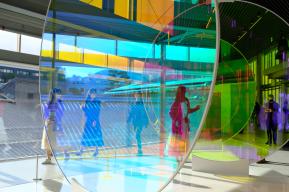

ReIShaping Policies for Creativity and Artistic Freedom
The project
In 2022, Sweden renewed its cooperation with UNESCO to support a third phase of the project entitled ReIShaping Policies for Creativity and Artistic Freedom. The project supports policy monitoring and design to promote the cultural and creative industries at national and global levels. The project aims to strengthen human and institutional capacities, through inclusive policy dialogue mechanisms between governmental and civil society actors, to monitor and design policies and measures protecting and promoting the diversity of cultural expressions through a participatory and evidence-based methodology. At the global level, the project is supporting the production and promotion of global knowledge sharing tools, aiming to empower governments and civil society to elaborate evidence-based policies, strengthen a community of practice, and support advocacy and awareness raising on policies for creativity.
July 2022 to December 2025
Component 1: Strengthening inclusive policy dialogue and informed policy-making for the cultural and creative industries Bolivia, Botswana, Cabo Verde, Côte d’Ivoire, Lao People’s Democratic Republic, Mexico, South Sudan, and Timor-Leste
UNESCO currently provides technical assistance to eight partner countries for the participatory elaboration and uptake of their Quadrennial Periodic Reports (QPRs) on the implementation of the 2005 Convention. The QPR is a report compiling data and information on the cultural and creative sectors at the national level and policies and measures to protect and promote the diversity of cultural expressions. Through this process, this project fosters inclusive policy dialogues between governments and civil society, including artists, creative and media professionals to support policy monitoring, report on trends and challenges, and collectively define recommendations for the future of the cultural and creative sectors. The QPR has been increasingly recognized as a strategic priority-setting tool to inspire evidence-based, transparent, and participatory policy making practices in favour of dynamic, sustainable, and fair cultural and creative sectors. Going beyond the QPR, the project enhances inter-ministerial cooperation for the cultural and creative industries (CCIs), to raise awareness and advance actions addressing gender equality, media diversity or artistic freedom, as well as to foster peer-to-peer exchanges to strengthen a community of practice on policy monitoring and policy making at the regional and global levels.

Component 2: Participatory policy making for gender equality in the cultural and creative industries Indonesia, Peru, and Senegal
The project ReIShaping Policies for Creativity and Artistic Freedom integrates a pilot program to move from a policy monitoring exercise to policy making by addressing gender equality in the cultural and creative sectors in three countries that have previously partnered with UNESCO in the framework of the phase II SIDA program, namely Indonesia, Peru, and Senegal. To this end, the program provides technical assistance for the participatory design of a gender-transformative measure/action plan for the cultural and creative sectors, building on participatory methodologies. Building on the positive impact of the gender-transformative guidelines developed and implemented in the framework of Phase II of the Sida project Reshaping Cultural Policies for the Promotion of Fundamental Freedoms and the Diversity of Cultural Expressions (2018-2022), the project aims to consolidate a network of expertise on policies and measures in support of gender equality in the CCIs and develop new innovative tools and mechanisms to support the participatory elaboration of gender-transformative measures/action plans for the cultural and creative sectors at the country and global levels. The human and institutional capacities of governmental and civil society actors, including human rights and women’s rights organizations and institutions, will be sustainably strengthened to ensure the participatory formulation of concrete gender-transformative measures adapted to national contexts and needs in Indonesia, Peru, and Senegal.

Timeline of Activities
Partner
.





